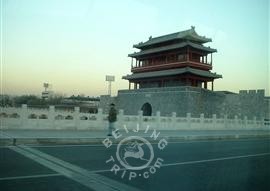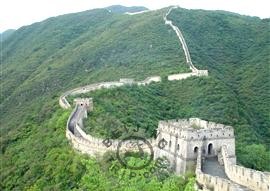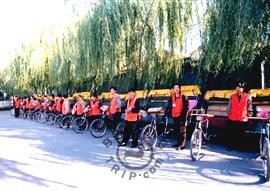
Beijing (formerly called Peking, Beiping, Dadu, Jingcheng, and Yanjing in different periods of Chinese history) is the capital city of the People's Republic of China. It is also the nation's political and cultural hub. Additionally, it is the focal point for the country's transportation, scientific and technological development, education and communication. Its present-day population is over eleven million, thus, it is the second largest city in China.
Beijing is universally acknowledged for its rich history and cultural development. It is also recognized as a modern international metropolis full of energy and vitality. It is located on the northwest part of Huabei Campagna (the North China Plain) about 150 kilometers (93 miles) west of the Bohai Sea. It has been the capital city of many dynasties in Chinese history. The city's grid pattern and original city walls were first laid down in the 13th century when it was called Khanbalik, the capital city of the Yuan Dynasty (1271-1368). It was razed, rebuilt and named Beijing by the Han Chinese rulers of the subsequent Ming Dynasty (1368-1644). It also served as capital city of the Qing Dynasty (1644-1911).
![]() Read more about History of Beijing
Read more about History of Beijing

Beijing is world-famous for its trove of historical sites and enchanting natural scenery, making it a compelling tourist destination among people's China tour package itinerary. It offers a staggering array of attractions including the resplendent Forbidden City; the majestic Tiananmen Square (the world's largest public square); the grand meandering Great Wall, and Beihai Park (Beijing's oldest imperial garden). It's a remarkable city offering an abundance of ancient and modern architecture, temples, gardens, and museums and a variety of colorful local customs.
No other city in China offers the range of accommodations Beijing does. There are enormous numbers of four and five-star hotels in convenient locations throughout the city. It is also a food-lovers' dream. It is difficult to imagine a city with more restaurants per square kilometer or a more exhaustive variety of Chinese and foreign cuisines. There is also no shortage of entertainment with the Beijing Opera, concert halls, acrobatic troupes, and teahouses being popular choices.

The city is rapidly changing as it continually modernizes. You'll see everything ranging from a Harley Davidson motorcycle dealership to upscale women's fashion boutiques to military displays at the Chairman Mao Memorial Hall. Despite its progress, the city values its great historical culture and its antiquities. You can capture the true essence of the city by walking around the Summer Palace and its pavilions or strolling through the courtyards and quadrangle houses or the quaint and serene Hutong. The modernization has also had a salutary impact on Beijing's citizens. Since reform, living conditions and purchasing power have improved dramatically.
Few cities have the unique historical charm of Beijing. Its wide thoroughfares, magnificent gate tower and memorial arch, and grand palaces all speak to the extensive history of this city. It also stands as a symbol of China's grandeur, history, culture and mystery. It is also an approachable and visitor-friendly city. It eagerly looks forward to being on the world's stage when it hosts the Summer Olympic Games in 2008.
Read more about: Fast Facts of Beijing
|
Recommended Beijing Tour Itineraries:
Beijing One-Day Tours: 5 itineraries for you to choose.
Beijing Two-Day Tours: 2 itineraries to visit Tiananmen Square, Forbidden City, Temple of Heaven, Summer Palace, Badaling Great Wall, etc.
4-Day Beijing Travel: to the most popular attractions in the city.
|